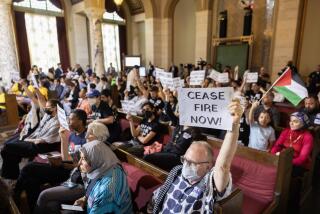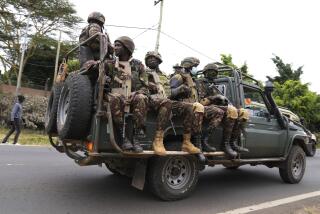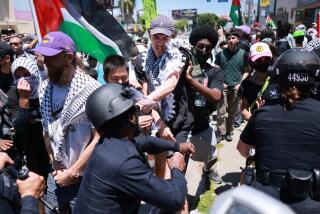S. Africa Arrests Tutu, Others in Clergy Protest
JOHANNESBURG, South Africa — Anglican Archbishop Desmond M. Tutu and dozens of other South African religious leaders were arrested in Cape Town on Monday as they attempted to march to Parliament to protest the government’s latest ban on anti-apartheid activities.
The churchmen, with gold crosses around their necks and Bibles in their hands, were taken away by security police as they left St. George’s Anglican Cathedral on a 150-yard procession toward Parliament, where they had planned to present a petition against the government action and to pray for peace.
Altogether, about 150 people, mostly priests and nuns, were arrested and taken to police headquarters, where they were released on their own recognizance pending “investigation” of formal charges. These could include participation in an illegal demonstration and various other violations of the country’s security laws and emergency regulations.
‘Merely Obeying God’
“We have been merely obeying God by marching to Parliament,” Tutu said later. “What we did was not a negative action. It was a positive way of obeying God. We have committed ourselves. We are going to be with our people where it hurts. . . . If in our witness to Jesus Christ, we are arrested, well, that’s hard luck. But we must obey God rather than man.”
The incident stemmed from government action last week effectively outlawing the political activities of 18 groups, including the United Democratic Front, a coalition of 750 anti-apartheid groups with 3 million members, and the Congress of South African Trade Unions, the nation’s largest labor federation with 1 million members.
So determined are religious leaders in their opposition to the new bans that President Pieter W. Botha’s government could now face a major confrontation with the churches--a conflict that could not only bring many more demonstrations but transform the largely moderate clergy into angry opponents of the white-led minority government. And it could turn the churches into even more of an opposition group, replacing those organizations whose political activities have been banned.
Government actions intended to reduce black opposition to its policies have already broadened and deepened the anti-apartheid resistance over the past four years. Afrikaners, who dominate the ruling National Party as well as the government and who pride themselves on their religiosity, could soon be in the midst of a bitter confrontation between church and state with far-reaching political implications.
“By imposing such drastic restrictions on organizations that have campaigned peacefully for the end of apartheid, you have removed nearly all effective means open to our people to work for true change by nonviolent means,” the clergymen said in their undelivered petition.
“We have not undertaken this action lightly. We have no desire to be martyrs. However, the Gospel leaves us no choice but to seek ways of witnessing effectively and clearly to the values of Our Lord and Savior Jesus Christ, and you give us no other effective and peaceful means of doing so.”
Tutu, winner of the 1984 Nobel Peace Prize, was the first clergyman bundled into a waiting police car.
The Rev. Allan Boesak, moderator of the Dutch Reformed Mission Church and president of the World Alliance of Reformed Churches, was taken next. Roman Catholic Archbishop Stephen Naidoo, the Rev. Khoza Mgojo, president of the Methodist Church, and the Rev. Frank Chikane, general secretary of the South African Council of Churches, followed.
Refused to Disperse
Riot police, who had linked arms to prevent the procession from moving more than 15 yards from the cathedral, then attempted to disperse the remaining clergymen, most of whom had knelt or sat on the pavement and were singing hymns. But they refused to move and were arrested. As they were placed aboard police vans, the clergymen recited the Lord’s Prayer. A water cannon used to drench the demonstrators also knocked down a number of observers, including several European diplomats.
Also taken into custody were several reporters, news photographers and television crews. They were questioned and released pending criminal charges under emergency regulations that prohibit first-hand coverage of political disturbances here. The wife of the Canadian ambassador was detained briefly, and several European diplomats complained they were manhandled and bruised by riot police, who apparently mistook them for journalists.
“In the past, it was possible for people to say that it was the usual rabble-rousers who were demonstrating,” Tutu commented later. “They can’t say that any more--it is the church. And that is an important point that has been made here.”
Boesak suggested that the march would be portrayed by the government as an “act of terrorism, an act of subversion.”
Obeying ‘a Higher Law’
“We told the South African government we had decided that we would be obedient to God,” he told a press conference after his release. “That is a higher law to us, and we are obeying that higher law. Is that terrorism?”
At national police headquarters in Pretoria, a spokesman said the riot police had no choice but to arrest the clergymen and break up the “illegal procession” toward Parliament. The South African constitution does not guarantee the country’s citizens either the right of assembly or the right to petition the government, and protests near Parliament are prohibited by law.
“The police displayed all possible reasonableness, warning those taking part in the procession that their actions were illegal and requesting them to disperse,” the spokesman said.
The Very Rev. Edward King, dean of St. George’s Cathedral, which sits opposite Parliament and other government buildings, had been personally warned that if the clergymen proceeded with the march “the police would have no alternative but to take action against them,” the spokesman added.
“Notwithstanding this warning, the procession took place and, after being requested to disperse, the group ignored the call and sat down in the road from where the police were forced to remove them. . . . A charge against them will be investigated in the normal manner.”
Police Action Assailed
But the police action was immediately criticized by members of Parliament from the liberal Progressive Federal Party, which said that no action was taken Saturday when several hundred members of the ultra-right Afrikaner Resistance Movement, many of them armed with rifles and pistols, marched on the government buildings in Pretoria and presented a petition demanding that they be allowed to secede from South Africa and form an all-white state.
The Reagan Administration, which supported the reformist policies of the Pretoria government for many years, denounced both the police action outside Parliament and the effective banning of the major anti-apartheid groups.
“The United States strongly condemns the South African government’s forceful repression of peaceful demonstrators,” an American Embassy spokesman said. “By criminalizing and suppressing the exercise of basic political human rights, the South African government is shutting off avenues for nonviolent change.”
In their petition, the clergymen warned that the effective banning of the United Democratic Front, the Azanian People’s Organization and other groups, as well as the bar on political activities of the Congress of South African Trade Unions, could lead to more violence and a heightened crisis in the country.
“We believe that the government in its actions over recent years, but especially by last week’s action has chosen a path for the future that will lead to violence, bloodshed and instability,” the petition said.
“Your actions indicate to us that those of you in government have decided that only violence will keep you in power, that you have chosen the military option for our country.”
More to Read
Sign up for Essential California
The most important California stories and recommendations in your inbox every morning.
You may occasionally receive promotional content from the Los Angeles Times.










